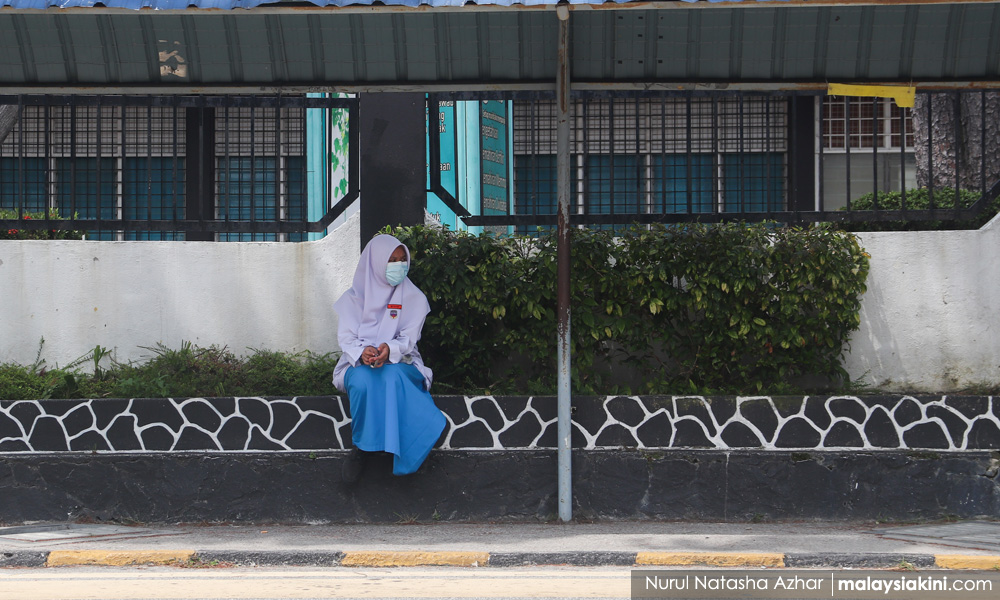Period spot checks are "a form of bullying" that can have a negative impact on young girls for many years afterwards, said psychological experts in calling for the Education Ministry to put a stop to such a practice.
The Malaysian Mental Health Association (MMHA) pointed out that the inspection of menstrual signs by religious teachers on schoolgirls for missing prayer sessions could also affect the mental health of students.
"Period spot checks on school girls as highlighted recently are disgraceful and can be construed as a form of bullying.
"Like all other forms of bullying, the psychological impact can cause anxiety, depression and low self-esteem, resulting in poor performance at school or complete disinterest in schooling altogether.
"Repeated period shaming in schools can also have long-term psychological impact years later on the adult," said its president Dr Andrew Mohanraj.
"The association of menstruation with shame, curse and taboo is prevalent in many cultures around the world," he added, saying that the MMHA is calling for authorities to look into the matter and for schools to be instructed accordingly.
Andrew was commenting on reports by Malaysiakini that girls in multiple schools have to undergo “period spot checks” where they are told to physically prove they are on their period through means which violate privacy.
The measures include showing their blood-soaked sanitary pads, doing swabs of their vagina with either cotton buds, tissue papers or their fingers, or having a teacher, warden or school prefect pat them down at the groin to feel if they are wearing a sanitary pad, they said.
Over a dozen individuals reached out to Malaysiakini and recounted how the behaviour towards menstruation at boarding schools was “shameful” but was accepted as “normal practice”.
A key trigger was the practice of teachers or senior students demanding “proof of menstruation” from girls who did not join daily congregational prayers which are commonly held in residential or religious-based schools.
In Islam, women or girls who are menstruating do not perform ritual prayers.
Penang mufti Wan Salim Wan Mohd Noor has spoken out against the practice, saying no one has the right to embarrass girls and women by checking their private parts to see whether they are menstruating.

Clinical psychologist Evone Phoo said that while not everyone may feel the same level of trauma, it doesn’t change the fact that these women, as teenagers, have been subjected to demeaning treatments that affected them at that time.
"For some, this experience lingers and continues to affect them for many years to come. While the external experience may be similar (for each girl), the subjective experience is not.
"Hence, not only is it important to look into what happened to them, but even more importantly, to not dismiss their experiences of the incident," she told Malaysiakini.
"A girl’s menstrual cycle is a very private issue. During teenage years, they undergo drastic physical and psychological changes that they try to explore and understand.
"The fact that this biological cycle, a transition to womanhood that is supposed to be natural and accepted, has been subjected to intrusion and harassment, may indeed impact on the girls’ perception of themselves, their body, or sexuality," Phoo said.
Need to provide 'evidence'
Some of the students testified that because of the spot checks and the need to show evidence, they wore the same blood-soaked pad from previous days, which Phoo cautioned against.
"Due to the anticipation of spot checks which could happen any time, and the possible consequences of not being able to provide the ‘evidence’ when asked, some students might experience a high level of anxiety and worry in anticipation of the spot checks, hence they might try to hang on to the ‘evidence’ until it happens.
"This is not only unhygienic, but also unhealthy for the students’ psychological wellbeing as they would be under a highly anxious state in those few days, on top of managing their hormonal changes from the period.
"Not to mention, the possible physical and psychological distress that follows the spot checks - that something so private and personal has to be now presented as ‘evidence’," she said.
The development of such practices may have evolved from issues of trust, added Phoo.
"Having faced students of all kinds for many years, some teachers might have formed a certain perception and feel the need to be firm and strict to manage them. This might mean using deterrents or punishments to shape students’ behaviours. Unfortunately, some of these methods might lead to traumatising experiences.
"Perhaps it is also the suspicion of being disobeyed and deceived, hence some feel the need to regain control through these intrusive spot checks," she said.

Former ministers Rafidah Aziz, Azalina Othman Said and Maszlee Malik have voiced their opposition to the practice, with Rafidah demanding that the Education Ministry put a stop to it and lay out clear ground rules on how schools, including boarding schools, treat students.
Former education minister Maszlee said such degrading practices must be stopped and condemned, and should have never happened anywhere, let alone in schools, where children should be safe and protected from any form of harm and abuse.
Women, Family, and Community Development Minister Rina Harun also expressed shock and vowed to engage the relevant authorities to ensure this practice ends.
"This is unacceptable and shouldn't happen in schools, I take this seriously.
"I will follow up with the relevant ministries, such as the Education Ministry, and Majlis Amanah Rakyat (Mara) so that this doesn't happen again," she said.
Malaysiakini is attempting to contact Education Minister Mohd Radzi Md Jidin for his response to the issue. - Mkini




No comments:
Post a Comment
Note: Only a member of this blog may post a comment.